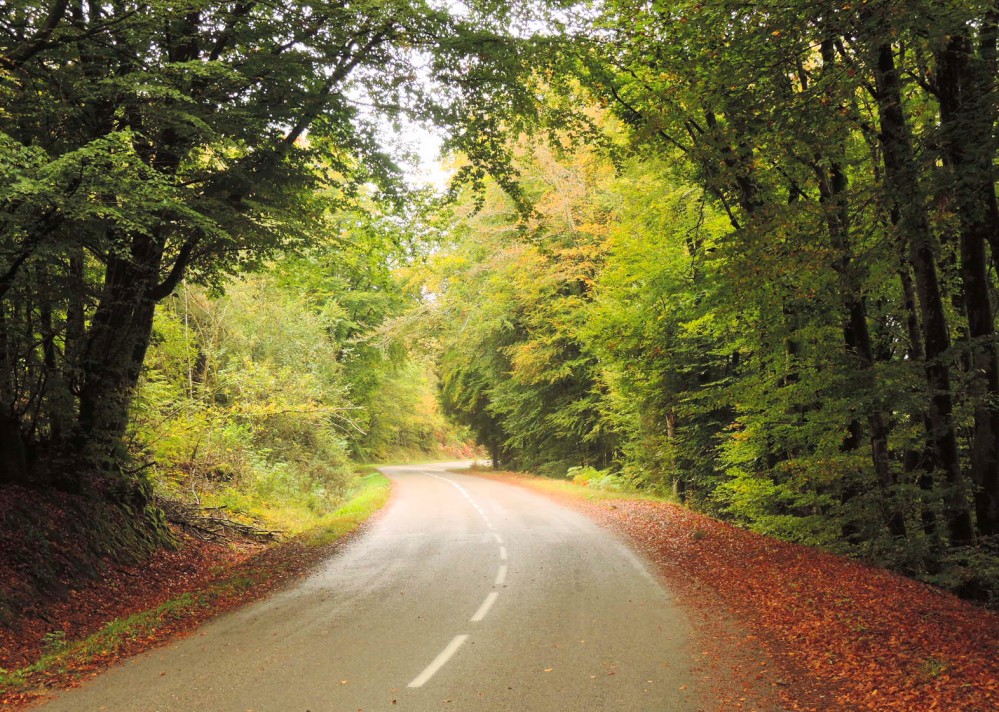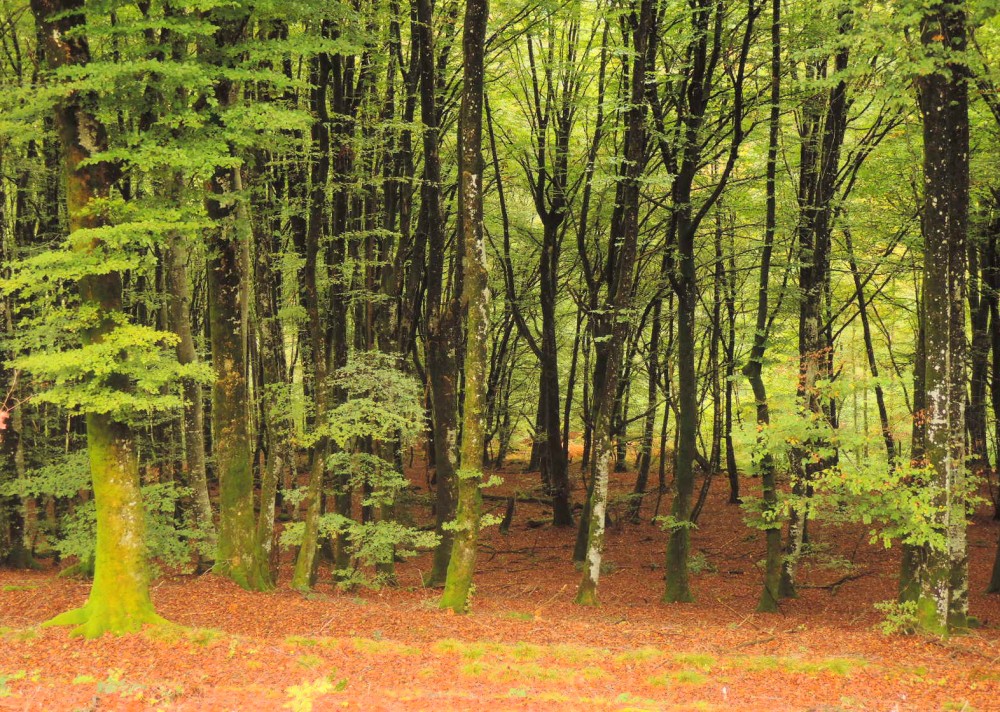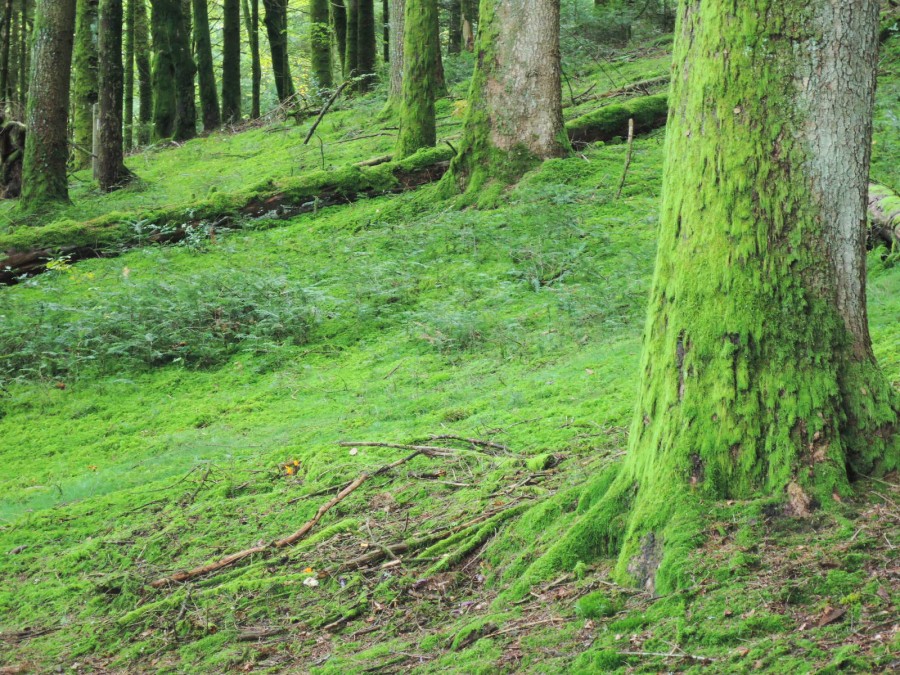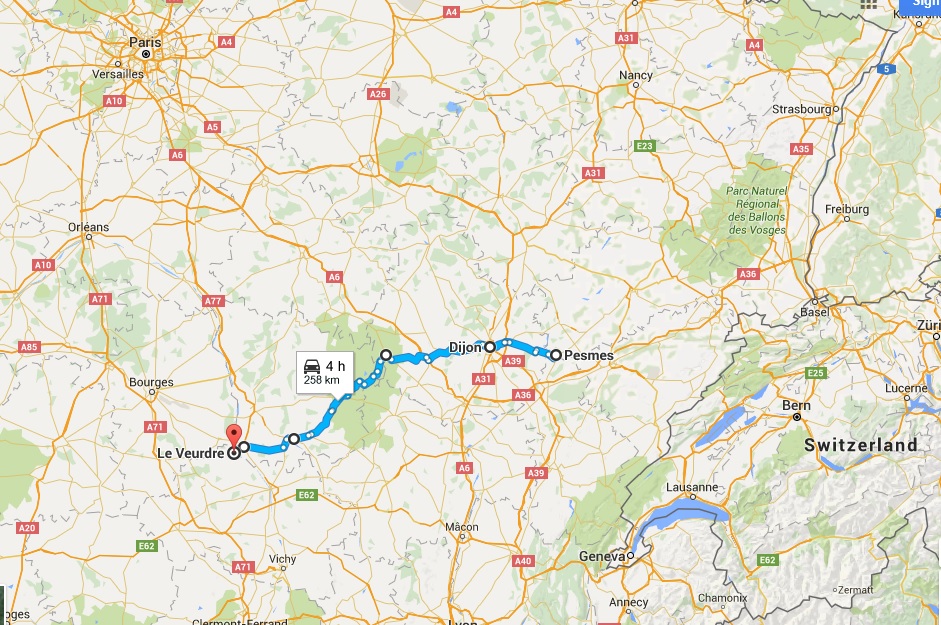Today, October tenth, two of my siblings will be celebrating their birthdays two thousand kilometres southwest of here. To that course, the weather forecast this part of France is not too good; it’s raining now, in fact; therefore I’m altering my planned itinerary in order to dodge another soak like yesterday’s. The sleep, however, has been fantastic; one of those rare ones that grant me a real rest; warm the room, quiet the hotel.
For a change, I’m taking a speedway stretch (the first one in fifteen thousand kilometres of journey) for leaving Dijon behind as soon as possible. When I’m near the city, four customs policemen on bikes swarm on me signalling me to pull over. Then, not bothering to salute, they blurt out their authority and stare at me as if to check my response. Do they have a reputation for being tough guys and I should freak out? I don’t know. I just say, ‘very good; what do you want?’ ‘To search your luggage’, replies one; ‘do you mind to open your cases?’ As I’m doing it, I ask him ‘do I have a choice, anyway?’, but he doesn’t answer. While they’re checking, I’m asked the typical questions: where do you come from, where are you going, what do you carry. They only check my bags, but not the few places where you can hide compromising stuff in a motorcycle. What the hell are they after? Whatever. As nothing is found, they mount their bikes and ride away… obviously taking a French leave. As nice as my country’s Guardia Civil; c’est à dire, churls.
After Dijon, I retake my usual secondary roads, and shortly after, in Saulieu, I stop for a coffee and a croissant, my must-do breakfast while in France, that I’m not going to skip today even though it’s past noon. Quite a nice city, by the way (alike so many others in this country), but I’d rather not ramble it, lest the rain – that I’m hardly escaping so far – gets worse any minute.
Salieu lies within the boundaries of the strikingly beauty Morvan national park, that encloses settings similar to those I’ve been passing through these days back, only more astonishing: colours are denser and more contrasting, closer, almost tangible; chiaroscuros are intense, flora is more varied, fallen leaves make a thick bed, moss ornates the trunks, the ground is covered with primitive fern… This is, without a doubt, the prettiest stretch I’ve gone through in the whole journey, except of course for Norway. Pity I’m forced – because of the weather – to focus so much on the asphalt, lest I come across a wet patch after any of the many bends of this narrow road; by the way the last curves I’m going to find in many kilometres from now on, because these foothills are the last spur on my route until I reach the Pyrenees. Everything in between will be ratther flat, I think.
A couple of hours later I declare finished today’s stage – one of the longest so far, with 260 km – at a place called Le veurdre, a tiny and unwelcoming village 10 km after Saint Pierre le Moûtier with no other appeal than having a hotel; and a quite expensive one, at that: € 70 (instead 40-45 as I’m paying lately) for a very average room. This is because of no competition, I suppose. I’m in Peys de Lévis, ugly region without any charm, not only aesthetically, but in other senses too: the tender woman at the grocery, dry as a plum, doesn’t reply to my “bon jour”; then at the bar opposite, cold and soulless, they only serve wine and bottled beer; and another bar I find by sheer chance (not even having a sign), full of smoke, is still less appealing. Wasn’t France was a smoke-free country?
And by association of ideas, I wonder: is there any relation between the environment and people’s character? Does an ugly land turn its inhabitants dourer? An inspiring milieu, does it make for kinder people? Or is it the other way around?: do more sensitive people tend to populate the nicer places? This is not the first time I feel I’m finding such connections; but then, there being so many variables at play, this may just be a misperception on my part, influenced perhaps by my own mood, which in turn may be conditioned – now yes – by the environment; so, after all, such link I find between land and character, is it but my subjective impression? Well, if you’re a curious reader I set it out as an exercise for you.





Dear Pablo,
my impression is that the connection between the environment we live in and our character is rather strong. Let’s take for example (of course) Poland: most of the country is rather flat and boring (that’s of course my personal view), it’s not so easy to find places in nature which would charm anyone, let alone nice cities. I think it’s exactly Poland where this great, vast Eastern European Plain begins, with its dull landscape seldom dotted with nice lakes and forests. The rest is one huge plain field with no objects to attract eyes looking for beauty. Compared to hilly regions of e.g. Germany, France or Italy it’s boring like hell. What is the result of this dull landscape? It’s our Slavic mentality of being rather not kind to each other (and of course not to foreigners), we tend to be grim, the same like the landscape we live in. Thus, most of the cities are quite blunt, filled with murky people not smiling to each other. Our only sensitivity is a child of desperation and most of the valuable art created in Eastern Europe is related to pessimism in one way or another. The best rock music written in Poland comes from the 80s, when everything was even more dismal than usual (everything was falling apart as the communism was slowly coming to its end). Poland is not only torn culturally and historically between East and West, it’s torn as well by its landscape, as it gradually looses its diversity and integrity. Moving to the East, everything slowly disintegrates and looses its form. One can still get inspired by this phenomenon but it will never make anyone kind. One can be over-sensitive living in this environment, melancholy. Maybe these are the two only options for us Slavs: either one is dull and indifferent of one is too sensitive and melancholic.
Additionally, You know all too well the way we treat our public space, we, obviously the same like Spaniards, destroy old buildings with the utmost pleasure and, on top of it, we heavily pollute the public space with advertisements of all possible ugly sorts.
Countries with more compact and diverse landscapes bred other sorts of people, I believe.
Hugs!
Artur
Thank you for your valuable contribution, and I’m glad that your personal perception matches mine. Would you then say that the dull and pessimistic Polish character is more related with the landscape than with the weather and light? Everytime I’m told, by a Polish person, that the latter factors are to blame, I tend to disagree, since there are countries where light and weather is not any better than in Poland, yet people are nicer. But then, have you and I discovered an anthropological fact? There must be already some researches out there on the connection (or lack thereof) between landscape and character, I bet. And I wouldn’t like to play the “cheap” anthropologist or sociologist. Are we dooming flat and soulless lands’ inhabitants to gloom and pessimism? Poland has, I’ve been told, beautiful mountains in the south and there is also the lovely Mazury region in the north. Would you say people in those regions are nicer than average? Spain, on the other hand, also has large flat areas that account for perhaps one third of our total territory. I don’t visit those areas too often, but I don’t know if I’ve found a notable difference in character…
As you see, I resist to back my own conclussions. 🙂
Not looking for an argument. It’s just that I’m an actual American from the United States.
Came across this:
“October twelfth, anniversary of the discovery of America, day of Hispanic World for us Spaniards, much to the displeasure of our American cousins, who are always ashamed of their great-grandparents.”
THATS JUST NOT AT ALL TRUE. ITS POSSIBLE YOU’VE HEARD THE LEFTY NEWS TOO OFTEN. ITS EASY TO MAKE THE MISTAKE THAT WE ARE NOT PROUD OF OUR GRANDPARENTS.
If anything Americans are infatuated with their family immigration past and dream of visiting Europe to visit where uncle Luigi or grandpa Schultz were raised.
As far as Columbus or Cortez go; hey I’d have explored some of those indigenous babes too.😉
The WOKE assholes want to do away with Columbus day. They call it INDIGENOUS DAY or EUROPEAN INVASION DAY…
Most INDIGENOUS all over the world were not the Hollywood version of the stoic wise native. That’s not to say we couldn’t learn from them but ……. For example, the Comanche would make war with other tribes, capture a baby, drag it behind a horse through thorns and return to camp . The still alive baby would be tossed onto the fire; it’s body swelling and when it exploded the entire tribe would cheer.
Yes, atrocities on both sides but I’m proud of my EUROPEAN immigrant family.
Viva Columbus
I wonder where you’ve read that quote. Certainly not in this post, though I possibly have written it in some other. Please submit your comments to the right post.
Anyway, I know USans are not ashamed of their ancestors. By “our American cousins” I don’t mean USans, but the Americans who are Spaniards’ cousins, i.e., those south of Rio Bravo del Norte, all the way to Tierra del Fuego.
Yes, the woke ideologists want to do away with Columbus and, actually, with History itself. Indigenism is one of their inventions. For instance, they don’t want people to know that, in the independence wars, natives fought alongside the Spanish crown, not against.
As to the indigenous’ barbarious practices, that’s probably why the Anglo-Saxon colonizers wouldn’t come across any better solution than exterminating them and seizing all of their land. Protestantism key feature is hypocrisy. Not looking for an argument. 😉